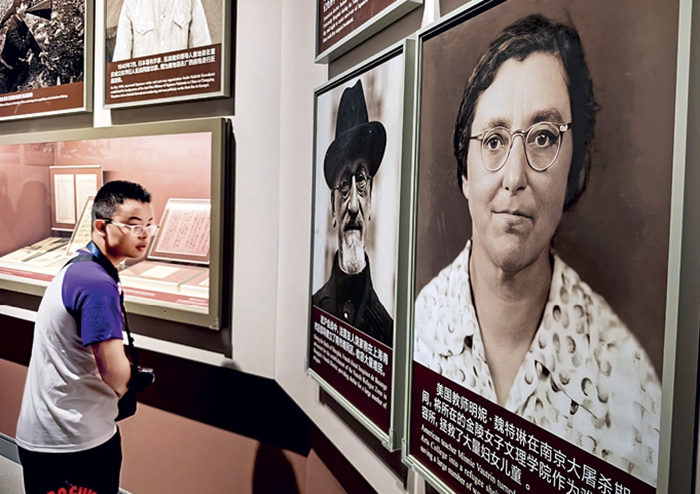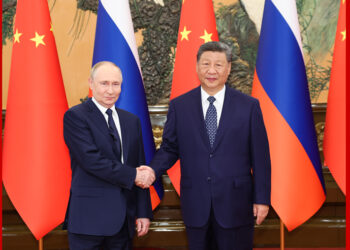And yet it was she who stood up to fascism first. A decisive contribution, without which the allied victory would have been impossible. Today, to restore this historical truth is to strengthen the foundations of world peace.
Sleeve impacts on the Wanping fortress during the Lugou bridge incident
May 8, 2025 marked the 80th anniversary of the end of the Second World War in Europe. This solemn moment, synonymous with the release of the Nazi yoke, is commemorated in many Western countries, especially in France. However, an absence weighs heavily on official memories: that of China. War theater long before the invasion of Poland, China was one of the pillars of victory against the powers of the axis. As the historian Pierre Grosser shows, without the obstinate resistance of the Chinese people, the allies could never have contained the Japanese expansion or weaken the war economy of the axis. However, this fundamental commitment is barely mentioned in textbooks, the media or French commemorations.
A total war started in 1937: China on the front line
On July 7, 1937, Imperial Japan attacked China at the Lugou bridge (also called Marco Polo bridge), marking the beginning of what Chinese historians called the “war of resistance from the whole nation against Japanese aggression”. This is where the Second World War really begins, according to Pierre Grosser and Rana Mitter.
For eight years, China was carrying out a total war against a super -high invader, at the cost of colossal human losses: more than 20 million dead, tens of millions of injured or displaced. The Nanjing massacre (1937), the use of chemical weapons, bombing of cities like Chongqing are unknown but essential episodes of fascist barbarism. Many of these violence have been documented by Western witnesses: the American missionary John Magee filmed them clandestinely with his 16 mm camera, while the German businessman John Rabe recorded them in his notebooks while organizing the protection of Chinese civilians.
Despite internal divisions, the Guomindang of Tchang Kaï-Chek and the Chinese Communist Party manage to maintain a united front against the Japanese enemy. This strategic compromise, known as the second united front, made it possible to channel resistance efforts at the national level. China thus becomes a crucial element of the Allied strategy: by fixing more than a million Japanese soldiers on its territory, it prevents their redeployment in the Pacific or Southeast Asia, lightening pressure on American and British forces in Asian theater.
The Cairo Conference (1943), bringing together Roosevelt, Churchill and Tchang Kaï-Chek, consecrates China as one of the “four big” of the nascent international order. During this conference, it is explicitly recognized that the Chinese territories annexed by Japan will have to be returned. In 1945, China became a permanent member of the UN Security Council, alongside the United States, the United Kingdom, the USSR and France. This status symbolizes the recognition of its leading role in victory.

Section devoted to international support for the exhibition “For national liberation and world peace”, at the Chinese People’s War Museum against Japanese aggression in Beijing, July 19, 2025
Memorial erasure: forgetting China in French and Western stories
Why this massive forgetfulness, even this erasure? Several historical factors combine. First of all, the European vision of world war, centered on the Western front and the Shoah, marginalizes Asian theaters. Then, the Cold War transforms communist China into an ideological adversary: the memory of China Allied fades in favor of a conflictual representation. In the context of the post-1949, diplomatic relations between France and the People’s Republic of China were nonexistent until their recovery in 1964 under de Gaulle, which has long slowed official recognition.
In French textbooks, China is barely cited. National commemorations do not integrate its contribution. Even in war museums, as in the Caen Memorial, the Place de la China remains marginal. However, this absence is not neutral: it produces a deformation of collective memory, an impoverishment of historical understanding. The representations which structure the Western imagination of the World War often relegate China to a peripheral, even non -existent role.
This forgetfulness also fuels contemporary misunderstandings between China and the West. How to build a dialogue of trust if the shared sufferings are not recognized? How to build sustainable cooperation without a common memory? The erasure of China in European stories translates a fracture of the global narrative, which can today nourish unnecessary suspicions and resentments.
For a global and shared memory: towards harmony between peoples
Memory is not just the case of historians. It founds values, solidarity, peace policies. Reintegrating China into the story of the Second World War is not a symbolic gesture: it is an act of justice and prevention. Justice for the millions of Chinese deaths. Prevention against nationalist drifts and cold war logics.
It is urgent to organize Franco-Chinese commemorations, museum cooperation, translations of Chinese testimonies, common educational projects. The example of cooperation between the Memorial of Resistance and the Chinese People’s War Museum against Japanese aggression could serve as a starting point. It would also be relevant to include specific educational modules in secondary history programs and to encourage cultural exchanges between young people from the two countries around shared memory.
It is necessary to restore a story with several voices, and to recognize that peace is not built in the erasure of the other, but in mutual recognition. Traditional Chinese thought, especially in Confucianism, highlights the idea of ”Ren” (仁), benevolent humanity, and “He” (和), harmony. These concepts, far from being abstract, can guide a diplomacy of peoples based on respect, memory and dialogue.
By recognizing China as a major player in the 1945 victory, we are more than correcting an injustice: we build a peace based on the respect of the peoples. As the French philosopher Paul Ricœur said, “shared memory is the condition of mutual recognition”.
Do not forget, do not erase, defend peace …
We must not repeat the mistakes of the past. To forget the role of China is to weaken the universal scope of the fight against fascism. Restoring this memory is to give meaning to the word “ally”. Peace is built with facts, gestures, and the shared will not to betray history.
Let us remember together, to better advance together. It is at this price that we can transmit to future generations a lucid and complete memory, and to offer them the hope of a world where history no longer divides, but brings together.
*Sonia Bressler is a philosopher and founder of the Silk Road – Editions.








